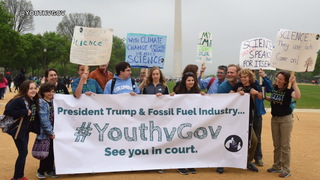
Guests
- Asad Rehmanspokesperson for Friends of the Earth International.
- Daniel Kammenscience envoy for the State Department and professor of energy at University of California at Berkeley.
“The clock is ticking on humanity’s ability to tackle the climate crisis,” says Asad Rehman, spokesperson for Friends of the Earth International, who calls on President Obama to “raise the bar on climate action” before he leaves office. We also speak with Daniel Kammen, science envoy for the State Department and professor of energy at University of California at Berkeley.
Transcript
AMY GOODMAN: Asad Rehman, President Obama is not gone yet. He is there for three weeks in January, not to mention all of December and now November. What do you think he should do? I mean, you’re talking right now to his climate envoy—well, to the climate envoy, the science envoy, for the State Department.
ASAD REHMAN: Look, as we all recognize, the clock is ticking on humanity’s ability to tackle the climate crisis and create a safer and more equal world for all of the world’s citizens. And in that, President Obama can still make a big difference. He can raise the bar on climate action. First and foremost, today is a solidarity day with the Native American people at Standing Rock. He could send a powerful signal, saying, “I stand with those people. I stand with ordinary people trying to protect their water, their air and their land.” That would be a positive signal. The United States has really contributed very little to these negotiations. In its fund for the Green Climate Fund, which helps the poorer people be able to adapt to the floods and the droughts that are happening all around the world, the United States currently has given $500 million. It still owes $2.5 billion. He could put—he could make sure that that check is delivered before he leaves.
AMY GOODMAN: OK, what about that, Daniel Kammen?
DANIEL KAMMEN: I think it is a very good point. So we know that the cost of climate change is high on a security basis, on a local basis. And fulfilling as many of these obligations as possible while in office makes a lot of sense, for not only the humanitarian reasons, but it’s actually good business. It promotes the kind of companies, the kind of entrepreneurs, that we think are pro-equality, not just pro-profits.
AMY GOODMAN: Very quickly, Daniel Kammen, right now, although the policy in the U.S. is leading away from coal, talk about what’s happening right now in Kosovo, an issue you know well. You’ve got like 30 seconds.
DANIEL KAMMEN: Yeah. Kosovo is tough case, because there’s a small coal plant in country. It’s the dirtiest in Europe. The U.S. committed earlier this year to not funding overseas coal. It’s a country where the wind and geothermal resources are enough, and yet—study after study from the outside has said go with the clean energy, and yet we’ve seen no switch in position from the World Bank. We haven’t seen a pullback from the U.S. position. It’s the kind of testbed where you want to see clean energy lead, not lag.
AMY GOODMAN: Will you be telling John Kerry this today?
DANIEL KAMMEN: I absolutely will.
AMY GOODMAN: Final comment, Asad Rehman? Thirty seconds.
ASAD REHMAN: Well, Friends of the Earth, all over the world, is committed to building the people power, the power of the movements, to be able to hold all of our governments accountable. We know here government leaders have an opportunity now to send a very positive signal. They could increase their pre-2020 emission target. They could put us on the pathway to keep under 1.5. And they can provide the finance of poorer countries to be able to grow cleanly and have a hope of a dignified life. We know that politics is not just in those buildings. Politics is about ordinary people united together and forcing change. We’ve done it before, and we will do it again.
AMY GOODMAN: Asad Rehman is the spokesperson for Friends of the Earth International, based in Britain. Daniel Kammen is science envoy for the U.S. State Department and professor of energy at University of California, Berkeley.
This is Democracy Now! When we come back, we take a kind of geopolitical tour of this country with a Moroccan activist. Stay with us.












Media Options